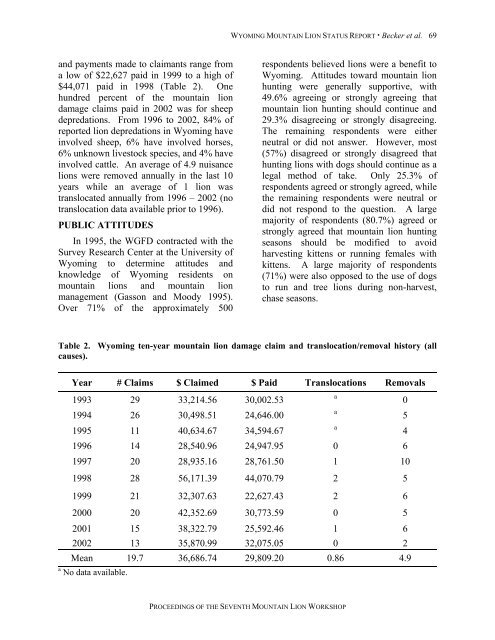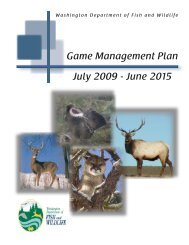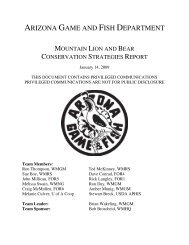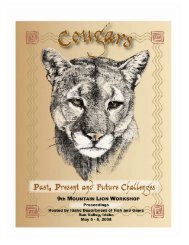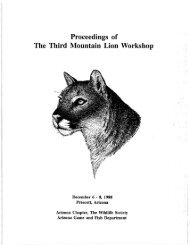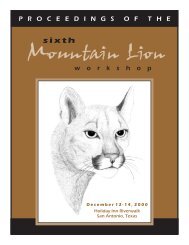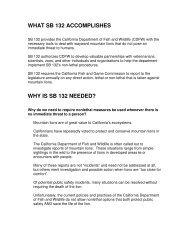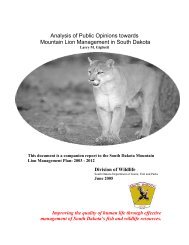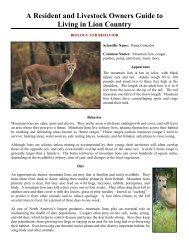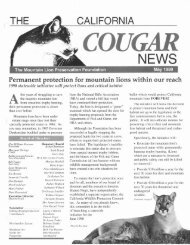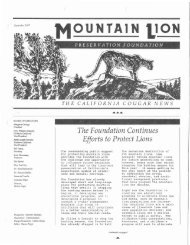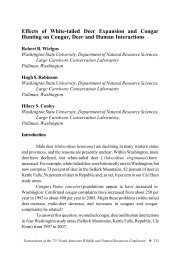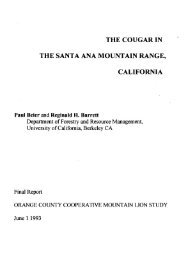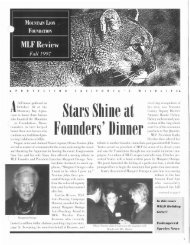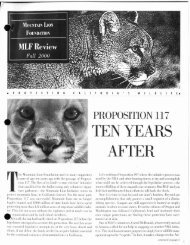Proceedings of the Seventh Mountain Lion Workshop
Proceedings of the Seventh Mountain Lion Workshop
Proceedings of the Seventh Mountain Lion Workshop
You also want an ePaper? Increase the reach of your titles
YUMPU automatically turns print PDFs into web optimized ePapers that Google loves.
and payments made to claimants range from<br />
a low <strong>of</strong> $22,627 paid in 1999 to a high <strong>of</strong><br />
$44,071 paid in 1998 (Table 2). One<br />
hundred percent <strong>of</strong> <strong>the</strong> mountain lion<br />
damage claims paid in 2002 was for sheep<br />
depredations. From 1996 to 2002, 84% <strong>of</strong><br />
reported lion depredations in Wyoming have<br />
involved sheep, 6% have involved horses,<br />
6% unknown livestock species, and 4% have<br />
involved cattle. An average <strong>of</strong> 4.9 nuisance<br />
lions were removed annually in <strong>the</strong> last 10<br />
years while an average <strong>of</strong> 1 lion was<br />
translocated annually from 1996 – 2002 (no<br />
translocation data available prior to 1996).<br />
PUBLIC ATTITUDES<br />
In 1995, <strong>the</strong> WGFD contracted with <strong>the</strong><br />
Survey Research Center at <strong>the</strong> University <strong>of</strong><br />
Wyoming to determine attitudes and<br />
knowledge <strong>of</strong> Wyoming residents on<br />
mountain lions and mountain lion<br />
management (Gasson and Moody 1995).<br />
Over 71% <strong>of</strong> <strong>the</strong> approximately 500<br />
WYOMING MOUNTAIN LION STATUS REPORT · Becker et al. 69<br />
PROCEEDINGS OF THE SEVENTH MOUNTAIN LION WORKSHOP<br />
respondents believed lions were a benefit to<br />
Wyoming. Attitudes toward mountain lion<br />
hunting were generally supportive, with<br />
49.6% agreeing or strongly agreeing that<br />
mountain lion hunting should continue and<br />
29.3% disagreeing or strongly disagreeing.<br />
The remaining respondents were ei<strong>the</strong>r<br />
neutral or did not answer. However, most<br />
(57%) disagreed or strongly disagreed that<br />
hunting lions with dogs should continue as a<br />
legal method <strong>of</strong> take. Only 25.3% <strong>of</strong><br />
respondents agreed or strongly agreed, while<br />
<strong>the</strong> remaining respondents were neutral or<br />
did not respond to <strong>the</strong> question. A large<br />
majority <strong>of</strong> respondents (80.7%) agreed or<br />
strongly agreed that mountain lion hunting<br />
seasons should be modified to avoid<br />
harvesting kittens or running females with<br />
kittens. A large majority <strong>of</strong> respondents<br />
(71%) were also opposed to <strong>the</strong> use <strong>of</strong> dogs<br />
to run and tree lions during non-harvest,<br />
chase seasons.<br />
Table 2. Wyoming ten-year mountain lion damage claim and translocation/removal history (all<br />
causes).<br />
Year # Claims $ Claimed $ Paid Translocations Removals<br />
1993 29 33,214.56 30,002.53<br />
0<br />
1994 26 30,498.51 24,646.00<br />
a<br />
5<br />
1995 11 40,634.67 34,594.67<br />
a<br />
4<br />
1996 14 28,540.96 24,947.95 0 6<br />
1997 20 28,935.16 28,761.50 1 10<br />
1998 28 56,171.39 44,070.79 2 5<br />
1999 21 32,307.63 22,627.43 2 6<br />
2000 20 42,352.69 30,773.59 0 5<br />
2001 15 38,322.79 25,592.46 1 6<br />
2002 13 35,870.99 32,075.05 0 2<br />
Mean 19.7 36,686.74 29,809.20 0.86 4.9<br />
a<br />
No data available.<br />
a


